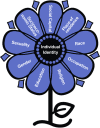Development and usability testing of tools to facilitate incorporating intersectionality in knowledge translation
- PMID: 35761251
- PMCID: PMC9238081
- DOI: 10.1186/s12913-022-08181-1
Development and usability testing of tools to facilitate incorporating intersectionality in knowledge translation
Abstract
Background: The field of knowledge translation (KT) has been criticized for neglecting contextual and social considerations that influence health equity. Intersectionality, a concept introduced by Black feminist scholars, emphasizes how human experience is shaped by combinations of social factors (e.g., ethnicity, gender) embedded in systemic power structures. Its use has the potential to advance equity considerations in KT. Our objective was to develop and conduct usability testing of tools to support integrating intersectionality in KT through three key phases of KT: identifying the gap; assessing barriers to knowledge use; and selecting, tailoring, and implementing interventions.
Methods: We used an integrated KT approach and assembled an interdisciplinary development committee who drafted tools. We used a mixed methods approach for usability testing with KT intervention developers that included semi-structured interviews and the System Usability Scale (SUS). We calculated an average SUS score for each tool. We coded interview data using the framework method focusing on actionable feedback. The development committee used the feedback to revise tools, which were formatted by a graphic designer.
Results: Nine people working in Canada joined the development committee. They drafted an intersectionality primer and one tool that included recommendations, activities, reflection prompts, and resources for each of the three implementation phases. Thirty-one KT intervention developers from three countries participated in usability testing. They suggested the tools to be shorter, contain more visualizations, and use less jargon. Average SUS scores of the draft tools ranged between 60 and 78/100. The development committee revised and shortened all tools, and added two, one-page summary documents. The final toolkit included six documents.
Conclusions: We developed and evaluated tools to help embed intersectionality considerations in KT. These tools go beyond recommending the use of intersectionality to providing practical guidance on how to do this. Future work should develop guidance for enhancing social justice in intersectionality-enhanced KT.
Keywords: Gender-based analysis; Health equity; Integrated knowledge translation; Knowledge translation.
© 2022. The Author(s).
Conflict of interest statement
The authors declare that they have no competing interests.
Figures
Similar articles
-
Developing the intersectionality supplemented Consolidated Framework for Implementation Research (CFIR) and tools for intersectionality considerations.BMC Med Res Methodol. 2023 Nov 9;23(1):262. doi: 10.1186/s12874-023-02083-4. BMC Med Res Methodol. 2023. PMID: 37946142 Free PMC article.
-
'Doing' or 'using' intersectionality? Opportunities and challenges in incorporating intersectionality into knowledge translation theory and practice.Int J Equity Health. 2021 Aug 21;20(1):187. doi: 10.1186/s12939-021-01509-z. Int J Equity Health. 2021. PMID: 34419053 Free PMC article.
-
Applying an intersectionality lens to the theoretical domains framework: a tool for thinking about how intersecting social identities and structures of power influence behaviour.BMC Med Res Methodol. 2020 Jun 26;20(1):169. doi: 10.1186/s12874-020-01056-1. BMC Med Res Methodol. 2020. PMID: 32590940 Free PMC article.
-
Supporting researchers in knowledge translation and dissemination of their research to increase usability and impact.Qual Life Res. 2022 Oct;31(10):2959-2968. doi: 10.1007/s11136-022-03122-1. Epub 2022 Mar 18. Qual Life Res. 2022. PMID: 35303224 Review.
-
Exploring the Application of Intersectionality as a Path toward Equity in Perinatal Health: A Scoping Review.Int J Environ Res Public Health. 2022 Dec 30;20(1):685. doi: 10.3390/ijerph20010685. Int J Environ Res Public Health. 2022. PMID: 36613005 Free PMC article.
Cited by
-
Towards equitable representation in long-term residential care: widening the circle to ensure "essential voices" in research teams.Res Involv Engagem. 2024 Mar 25;10(1):34. doi: 10.1186/s40900-024-00562-6. Res Involv Engagem. 2024. PMID: 38528627 Free PMC article.
-
Connecting for Care: a protocol for a mixed-method social network analysis to advance knowledge translation in the field of child development and rehabilitation.Implement Sci Commun. 2022 Dec 1;3(1):127. doi: 10.1186/s43058-022-00372-5. Implement Sci Commun. 2022. PMID: 36457120 Free PMC article.
-
Recommendations for promoting affirming healthcare for gender and sexual minorities with intersecting marginalized identities.BMC Health Serv Res. 2025 Apr 23;25(1):585. doi: 10.1186/s12913-025-12708-7. BMC Health Serv Res. 2025. PMID: 40269822 Free PMC article.
-
Barriers and enablers to and strategies for promoting domestic plasma donation throughout the world: Overarching protocol for three systematic reviews.PLoS One. 2023 Dec 21;18(12):e0296104. doi: 10.1371/journal.pone.0296104. eCollection 2023. PLoS One. 2023. PMID: 38128026 Free PMC article.
-
Taking Down the Walls to the Treatment of Aortic Stenosis.JACC Adv. 2023 Jul 28;2(5):100432. doi: 10.1016/j.jacadv.2023.100432. eCollection 2023 Jul. JACC Adv. 2023. PMID: 38939002 Free PMC article.
References
-
- Pfadenhauer LM, Gerhardus A, Mozygemba K, Lysdahl KB, Booth A, Hofmann B, et al. Making sense of complexity in context and implementation: the context and implementation of complex interventions (CICI) framework. Implementation Sci. 2017;12(1):21. doi: 10.1186/s13012-017-0552-5. - DOI - PMC - PubMed
-
- World Health Organization. Social determinants of health. [place unknown]: World Health Organization; c2021. Available from: https://www.who.int/teams/social-determinants-of-health. [cited 2021 Feb 22].
-
- Sorensen G. Introduction to social determinants of health. In: Goldman MB, Harch MC, editors. Women and health. San Diego: Academic Press; 2000. pp. 523–527.
MeSH terms
LinkOut - more resources
Full Text Sources
Miscellaneous



